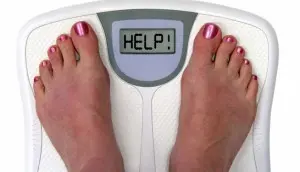The rate of obesity in the United States has tripled since 1980. Among Americans age 20 and older, 154.7 million are overweight or obese. Not one state in America has an obesity rate of 20% or less. This is quickly becoming a modern day epidemic in this country. Previously I wrote about what happens to your body when you gain weight. But why do most people gain weight in the first place?

I was once told that everything in life is physics. Now I am not here to bore you with a physics lesson. But the law of conservation of energy does apply to the why people gain weight. The law of conservation of energy states that energy can neither be created or destroyed, but can change form. So has does this apply to weight gain? The human body is a machine. Food contains calories which is the energy our body needs to fuel that machine. So if you are taking in more calories that you burn then that extra energy has to be transferred to another form and that is in the form of body fat. This is also referred to as energy balance. If you do not burn off the calories that you take in then you will gain weight over time.
Poor eating habits is another reason people gain weight. We are eating more calories than ever. This is in the form of carbohydrates which is processed in the body as sugar. In 1905, the average American ate only 5 lbs of sugar per year. In 2013, the average American ate 150-200lbs of sugar. Four grams of carbs is the equivalent of one teaspoon of sugar. Most of the food that Americans eat is sweetened with some form of sugar or processed to maximize the calorie content. At the turn of the century, most Americans at home cooked meals. In 2009, about half of what Americans ate was fast food or other foods away from home. The fact that these processed, carb rich, sweetened, caloric dense meals have become a mainstay in most American’s diets is a major contributing factor to weight gain.
An inactive lifestyle is another reason people gain weight. A lack of exercise will result in weight gain and obesity over time. Although, this is getting better in our country, there is still the fact that many of us are inactive due to the fewer physical demands at home or work because of modern technology and conveniences. The amount of time spent watching television, playing video games, and working at the computer continues to increase resulting is less energy spent through physical activity.
There is increasing evidence that your genes and family history can influence weight gain. Overweigh and obesity does tend to run in families. Your genetics can affect where and how your body will store fat. Due to the fact that families share food and physical activity habit, a link does exist between genes and environment.
Certain health conditions can also affect weight gain. Some hormone problems such as hypothyroidism, Cushing’s syndrome, and polycystic ovarian syndrome. Certain medications can also cause weight gain including corticosteroids, antidepressants, and seizure medicines.

Emotional factors, smoking, and age also can cause weight gain. The reason why people eat can be linked to their emotional state at the time. Many of us eat when we are bored, angry, or stressed and we tend to eat the food that makes us feel good. This is usually the carbohydrate/sugar laden food that is loaded with calories. Research has shown that this type of food causes a release of the neurotransmitter serotonin which is responsible for mood balance in the brain. When people stop smoking, they often gain weight. This is due to the fact that after one quits smoking food often tastes and smells better. Also, nicotine raises the rate at which your body burns calories, so you burn fewer calories when you stop smoking. However, the health risk of smoking is a serious health risk so quitting far outweighs the weight gain than you may experience. Of course, once you quit smoking then you can focus on losing the weight. As we age, our metabolism slows, we become less active and we lose muscle mass (muscle is a tissue that burns calories). If we do not account for this with change in diet and physical activity, we will gain weight.
Lack of sleep has also been shown to increase weight gain. People who sleep fewer hours tend to prefer foods that are high in carbohydrates and calories which is lead to weight gain. Sleep also helps to maintain a balance of the hormones that make you feel hungry (ghrelin) or full (leptin). If you don’t get enough sleep your ghrelin levels go up making you feel hungry. Sleep also affects how your body reacts to insulin. If you are not sleeping enough, your blood sugar level may increase resulting in diabetes.
The reasons that most people gain weight are dependent on many factors. Many of these are ones we can change. At Flex Physical Therapy, we have a program specially designed to help you lose weight effectively and quickly even if you have joint pain and can’t exercise. Call 1-800-930-8803 now to schedule your free weight loss consultation or attend one of our bi-weekly workshops and take control of your weight problem.
Check out our Facebook Page & Sign-up for a One-on-One Consultation: Facebook: Ideal Protein Flex PT


